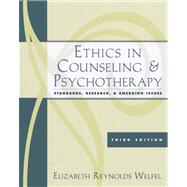
Ethics in Counseling and Psychotherapy Standards, Research, and Emerging Issues
- ISBN13: 9780534628338
- ISBN10: 0534628338
- Additional ISBN(s): 9780495604181, 9780534367527
- Edition: 3rd
- Format: Paperback
- Copyright: 2005-11-03
- Publisher: Brooks Cole
- View Upgraded Edition
-
Your order must be $35 or more to qualify for free economy shipping. Bulk sales, PO's, Marketplace items, eBooks and apparel do not qualify for this offer.








